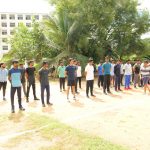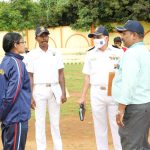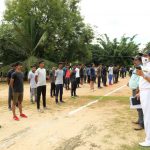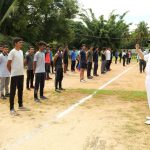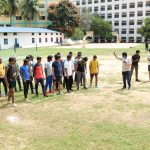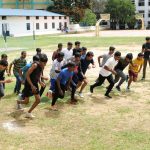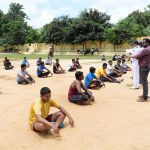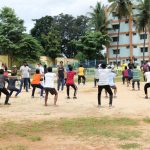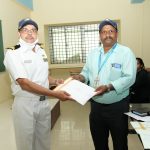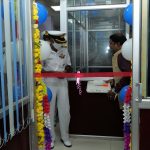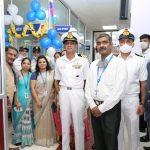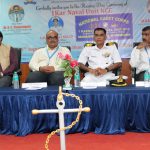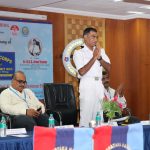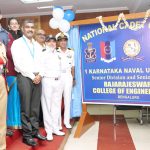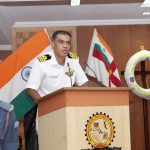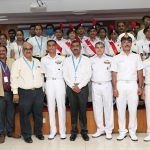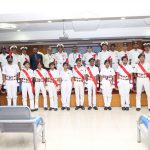The National Cadet Corps is the Indian military cadet corps with its head Quarters at New Delhi. It is open to school and college students on voluntary basis. The National Cadet Corps in India are a voluntary organization which recruits cadets from high schools, colleges, and Universities all over India. The Cadets are given basic military training in small arms and parades. The officers and cadets have no liability for active military service once they complete their course but are given preference over normal candidates during selections based on the achievements in the corps
Motto of NCC
The need for having motto for the Corps was discussed in the 11th Central Advisory Committee (CAC) meeting held on 11 Aug 1978. The mottos suggested were “Duty and Discipline”; “Duty, Unity and Discipline”; “Duty and Unity”; “Unity and Discipline”. The final decision for selection of “Unity and Discipline” as motto for the NCC was taken in the 12th CAC meeting held on 12 Oct 1980.
Unity and Discipline
Aims of NCC
The ‘Aims’ of the NCC laid out in 1988 have stood the test of time and continue to meet the requirements expected of it in the current socio–economic scenario of the country. The NCC aims at developing character, comradeship, discipline, a secular outlook, the spirit of adventure and ideals of selfless service amongst young citizens. Further, it aims at creating a pool of organized, trained, and motivated youth with leadership qualities in all walks of life, who will serve the Nation regardless of which career they choose. Needless to say, the NCC also provides an environment conducive to motivating young Indians to join the armed forces.
- To Create a Human Resource of Organized, Trained and Motivated Youth, To Provide Leadership in all Walks of life and be Always Available for the Service of the Nation.
- To Provide a Suitable Environment to Motivate the Youth to Take Up a Career in the Armed Forces.
- To Develop Character, Comradeship, Discipline, Leadership, Secular Outlook, Spirit of Adventure, and Ideals of Selfless Service amongst the Youth of the Country.
Cardinals of NCC
- Obey with smile
- Be punctual
- Work hard without fuss
- Make no excuses and tell no lies
NCC History
The NCC in India was formed with the National Cadet Corps Act of 1948. It was raised on 15 July 1948. The National Cadet Corps can be considered as a successor of the University Officers Training Corps (UOTC) which was established by the British in 1942. During World War II, the UOTC never came up to the expectations set by the British. This led to the idea that some better schemes should be formed, which could train more young men in a better way, even during peace times. A committee headed by Pandit H.N. Kunzru recommended a cadet organization to be established in schools and colleges at a national level. The National Cadet Corps Act was accepted by the Governor General and on 15 July 1948 the National Cadet Corps came into existence.
During the 1965 and 1971 wars with Pakistan, NCC cadets were the second line of defence. They organised camps to assist the ordinance factories, supplying arms and ammunition to the front, and were used as patrol parties to capture the enemy paratroopers. The NCC cadets also worked hand in hand with the Civil Defence authorities and actively took part in rescue work and traffic control. After the 1965 and 1971 Indo-Pak wars the NCC syllabus was revised. Rather than just being the second line of defence, NCC syllabus laid a greater stress on developing qualities of leadership and Officer-like qualities. The military training which the NCC cadets received was reduced and greater importance was given to other areas like social service and youth-management.
NCC Flag
NCC Flag Contains NCC Crest in gold in the middle, with the letters “NCC” encircled by a wreath of seventeen lotus with a background in Red, Blue, and Light blue. Red depicts the Army, Deep Blue depicts the Navy and Light Blue depicts the Air Force. The seventeen lotuses represent the 17 State Directorates. “Unity of Discipline” (Ekta aur Anushasan) is written at the bottom of the NCC Flag.

NCC Naval Unit, RRCE
- National Cadet Corps is a Tri-Services Organization comprising the Army, Navy and Air Force, engaged in grooming the youth – ‘The Leaders of Tomorrow’ – into disciplined and patriotic citizens.
- NCC of RRCE started in 2021 is been attached to 1 Kar Naval Unit NCC and has total sanctioned strength of 50 cadets which includes 17 girl cadets.
- All the activities of NCC will start at the beginning of new academic year in the month of August/September.
- Totally 20 parades will be conducted on Saturdays and general holidays for the enrolled cadets (not disturbing the academics of the students).
- During the parade time various activities like drill, weapon training and theory classes on naval subjects will be conducted to the students.
- Foot Drill, Arms Drill, Weapon Training, Leadership, Civil Defence, First Aid, Hygiene and Sanitation, National Integration, support to Civil Authority, Social Service, Adventure Activities, Self-defence, Ecology and Nature Awareness.
- Cadets also excel in the activities conducted in camps like National Integration Camp, CATC, Basic Leadership Camp, the most awaited trekking expeditions, Nau Sainik Camp by showing a tremendous level of endurance and grit.
- Communication, Navigation, Seamanship, Boat work, Anti Submarine Warfare, Seaward Defence, Damage Control, Ship Safety, Ship and Boat Modeling. So that the cadets get benefit from NCC.
- NCC is an integral part of celebrating nationally important days like Independence Day and Republic Day in college and performs high quality guard of honour at important ceremonies held in the college.
- The saga of excellence continues with the achievements of NCC in cultural aspects such as dance and music in the camps. To keep the spirits high and encourage the cadets to perform better.
- NCC RRCE organizes regular seminars from esteemed personalities in various sectors like Naval, Armed and Air force and Civil services. NCC installs in the cadets a deep sense of social service and service to fellow countrymen.
- To expose young cadets to a regimental way of life so that we can inculcate in them the values of discipline, sense of duty, punctuality, orderliness, smartness, respect for commanding authority, good and correct work ethos and self confidence.
- To generate interest in NCC training by including and laying emphasis on such aspects of institutional training which attract the young cadets into NCC and provide them an element of thrill and excitement together with training and conduct the activities in an innovative and interesting manner so as to covert work into play.
- To make use of the institutional training to inculcate interest to join the Defence Services.
- To create a culture this is characterized by hard work, sincerity, honesty, ideal selfless service, dignity of labour, secular outlook, comradeship and spirit of adventure and sportsmanship.
Care Taker Officer (CTO)
Sub.Lt.Prof. Thanuj Kumar M. working as Associate Professor in the Department of Mechanical Engineering has been appointed as ANO of 1 Kar Naval Unit NCC for RRCE from 13/08/2021.
He has undergone 3 months Pre-Commission Military Training Program at Officers Training Academy (OTA), Kamptee, Nagpur. After which he will be commissioned as an Associate NCC Officer with Sub. Lieutenant Rank.

Join NCC
Recruitment Process
• NCC recruitments will start of every academic year. Enrolment begins in the 2nd or 3rd week of August/September every year.
• People who are interested in joining NCC can register their names at the NCC office at CTDS.
• The interested students will have to fill in a form provided to them.
• Registered students will be called for recruitment to test their physical fitness and other criteria to be fulfilled to join NCC.
The selection process will consists of :-
Physical Test
1. Shuttle run for 400 meter to warm up
2. Running 2 to 4 km, in 15 mins
3. Sprint Run: 300 metres
4. Pushups minimum 20
5. Sit minimum 20
Written Test
Written exam consists of MCQ QUESTION 60 questions to be answered 30 mins
One to one interaction with ANO/Caretaker and Naval Unit staff.
Selection process to become NCC Cadet
Republic Day Celebrations 2025
Independence Day Celebrations 2024
Brief introduction to the student
3kms Running
Sit ups, Push ups, Squat, Crunches
100 meters Sprint Running
Written Test
Interview
Basic Training
Drill
Cadets must be made to understand the aim and purpose of teaching drill, so that they are suitably motivated and do not take it as “fatigue”. Emphasis will be laid on correct bearing, marching, saluting and arms drill. Inter-squad competitions may be organized to create interest.
Weapon Training
Cadets generally take keen interest in weapon training and firing. Units must liaise with nearby Service and Para-Military Units to ensure that all cadets get an opportunity to fire their authorized ammunitions. Use of firing simulators may be made to optimize training efforts where possible.
Adventure Training
Adventure activities have been incorporated in NCC training with the aim of inculcating and strengthening leadership traits amongst the cadets. These activities in NCC can be broadly divided into the following.
1. Land based – Mountaineering, Rock Climbing, Trekking
2. Water based – Sailing Expedition, White Water Rafting, Scuba Diving, River Crossing
3. Air based – Parasailing.
Youth exchange programme
This is a very important activity. It is done to increase international understanding and bolster awareness. These exchanges are done with NCC community of 10 countries namely Australia, Bangladesh, Bhutan, Canada, Maldives, Nepal, Singapore, UK, Russia and Vietnam at international level.
Camps And Training
The objects of the Camps are: –
1. To subject the cadets to Regimental way of life.
2. Train the cadets to make them physically fit.
3. Train the cadets to fulfill the aims of NCC.
4. Subject the cadets to various social service activities.
Training
Total training period for SD and SW is 3 years with an extension of 1 year permissible & training period for JD & JW is of 2 years. Every cadet of the Senior or Junior Division has to undergo service training for a period of at least 4 hours per week during the training year. However, no training is carried out during periods when the college or school through which a cadet is enrolled is closed for a vacation. Every cadet of the Senior and Junior Division has undergone service training for a minimum period of 75% of total hours during the annual college and school session. Every cadet (in case of JD, who has completed one full year of training and is in his second year) attends an annual training camp of 9–10 days, also known as National Combined Annual Training Camp. For SD/SW the duration is usually for up to 30 days. At the end of the camp training the cadets receive a certificate of successful completion.
Camps
A variety of opportunities to attend the camps and improvise in every aspect of a person’s personality is given in NCC. Some of the Camps include
1. Republic Day Camp (RDC)
2. National Integration Camp (NIC)
3. Basic Leadership Camp (BLC)
4. Advance leadership Camp (ALC)
5. Army Attachment Camp
6. Combined Annual Training Camps (CATC)
7. Hiking and Trekking Camps
8. Thal Sainik Camp (TSC)
9. Vayu Sainik Camp (VSC)
10. Nau Sainik Camp (NSC)
11. Rock Climbing Camps (RCC)
12. Youth Exchange Programme (YEP)
13. Waterman ship camp (WSC)
(👈 click) Annual Training Camp (10days) Conducted from 10th to 19th November 2021 at RRCE
PLEDGE OF NCC
We the cadet of the national cadet corps, do solemnly pledge that we shall always uphold the unity of India. We resolve to be disciplined and responsible citizen of our nation. We shall undertake positive community service in the spirit of selflessness and concern for our fellow beings.
NCC Song Lyrics
Hum Sab Bharatiya Hain, Hum Sab Bharatiya Hain
Apni Manzil Ek Hai,
Ha, Ha, Ha, Ek Hai,
Ho, Ho, Ho, Ek Hai.
Hum Sab Bharatiya Hain.
Kashmir Ki Dharti Rani Hai,
Sartaj Himalaya Hai,
Saadiyon Se HumneIskoApneKhoon Se Pala Hai
Desh Ki Raksha Ki Khatir Hum Shamshir UthaLenge,
Hum Shamshir UthaLenge.
BikhreBikhreTaare Hain Hum LekinJhilmilEk Hai,
Ha, Ha, Ha, Ek Hai
Hum Sab Bharatiya Hai.
Mandir GurudwaareBhi Hain Yahan
Aur Masjid Bhi Hai Yahan
Girija Ka Hai GhariyaalKahin
Mullah ki Kahin Hai Ajaan
EkHee Apna Ram Hain, Ek hi Allah Taala Hai,
EkHee Allah Taala Hain, RaangBirange Deepak Hain Hum,
lekinJagmagEk Hai, Ha HaHaEk Hai, Ho HoHoEk Hai.
Hum Sab Bharatiya Hain, Hum Sab Bharatiya Hain.
NCC Certificate Examinations
There are Three Certificates in NCC. Below describes about it from lower value to higher value:-
Certificate – A:
It can be written by JD/ JW cadets of NCC, cadets of class 8 & 9. After passing those classes it can’t be obtained. The candidate must have attended a minimum 75% of total training periods laid down in the syllabus for the first & second years of JD/JW NCC (All Wings). The candidate must have attended one Annual Training Camp.
Certificate – B:
It can be written by SD/SW cadets of NCC, cadets after class 10 & those studying for +2, +3 (degree). In the second year of NCC training they are permitted to appear for the same. The candidate must have attended a minimum 75% of total training periods laid down in the syllabus for the first & second years of SD/SW NCC (All Wings). He/She must have attended one Annual Training Camp/NIC. Cadets possessing ‘A’ certificate will be awarded 10 bonuses marks. An air wing cadet must do a minimum 10 Glide launches.
Certificate – C:
It is the most important certificate for NCC cadet. It can be written in the 3rd year of training, in the 3rd year of degree course/those having ‘B’ certificate can write it in the first year after his +2 and in the 1st year of degree by SD/SW cadets only. The candidate must possess ‘B’ certificate. Must have attended two ATCs or one ATC and in addition to it RD Camp Delhi, Centrally Organised Camp, Para Training Camp, Attachment Training with service units, National Integration Camp, Youth Exchange Programme, Foreign Cruise(Navy).
Frequently Asked Questions
1. What is National Cadet Corps?
Ans: The National Cadet Corps (NCC) is a youth development movement. It has enormous potential for nation building. The NCC provides opportunities to the youth of the country for their all-round development with a sense of Duty, Commitment, Dedication, Discipline and Moral Values so that they become able leaders and useful citizens. The NCC provides exposure to the cadets in a wide range of activities. With a distinct emphasis on Social Services, Discipline and Adventure Training. The NCC is open to all regular students of schools and colleges on a voluntary basis. The students have no liability for active military service.
2. When did National Cadet Corps Come into existence?
Ans: The National Cadets Corps came into existence under the National Cadet Corps Act XXXI of 1948 (passed in April, 1948; came into existence on 16th July, 1948).
3. What is the nature of the NCC Programme, whether compulsory or voluntary?
Ans: Voluntary.
4. Is the NCC Programme part of the educational activity or is it a part of military activity?
Ans: Educational Activity.
5. What is/are the Aim(s) of NCC?
Ans:
* To develop character, commandership, discipline, leadership, secular outlook, spirit of adventure and the ideals of selfless service amongst the youth of the country.
* To create a human resource of organized, trained and motivate youth to provide leadership in all walks of life and always available for the service of the nation.
* To provide a suitable environment to motivate the youth to take up a career in the Armed Forces.
6. What is the Motto of NCC?
Ans: The motto of NCC is: “ UNITY AND DISCIPLINE”.
7. What is the NCC symbol/insignia?
Ans: It is the NCC Crest in gold in the middle, with the letters “NCC”; encircled by a wreath of seventeen lotus with a background in Red, Blue and Light blue.
8. What does the colour Red depicts in the NCC Crest?
Ans: Red depicts the Army.
9. What do the colours Dark Blue and Light blue in the NCC Crest depict?
Ans: Deep Blue depicts the Navy and Light Blue depicts the Air Force.
10. What do the Lotus flowers depicts in NCC Crest?
Ans: The seventeen lotuses represent the 17 State Directorates.
11. When is the NCC Day observed?
Ans: The NCC Day is observed on the four Sunday of November.
12. Which Ministry at the National level deals with NCC?
Ans: The Ministry of Defence.
13. Which Ministry deals with NCC in all States?
Ans: Education.
14. What are the arrangements for Finances/Funds for NCC?
Ans: The funds are shared by the Central and State Govts.
15. What is Directorate General NCC?
Ans: It is the national level HQ.
16. What is the composition of Directorate General NCC?
Ans: It is headed by the Director General (DG), an Army Officer of the rank of Lieutnant General. The DG is assisted by two Additional Directors General (ADG), one a Major General from the Army and other a Rear Admiral from the Navy or an Air Vice Marshal from the Air Force. The Director General has a staff which is drawn from the three services – Army, Navy and Air Force. There are five Deputy Directors General (DD’sG) of the rank of Brigadier and equivalent, of which three are Brigadiers and one either a Commodore (Navy) or an Air Commodore (Air Force) and one a civilian officer.
17. Where is the NCC Headquarter at the National level located?
Ans: At New Delhi.
18. What is a NCC Directorate?
Ans: The NCC at the state level is divided into 17 Directorates, in which each state or group of states forms a Directorate. The smaller states and union territories are attached with Directorates of the bigger states. Each Directorate is under the command of an Officer equivalent to the rank of a Brigadier (being upgraded to the rank of Major General) or its equivalent from the other two Services.
19. What is a NCC Group?
Ans: The Directorates are further sub-divided into Groups, which varies according to the size of the state, each under the command of an Officer equivalent to the rank of Colonel (being upgraded to the rank of Brigadier). In all, there are 95 Group HQ’s in the country.
20. What is the composition of a NCC Group?
Ans: A Group consists of NCC Battalions, Air Force & Naval units. Other than the Group Commander, each Group HQ has an Administrative Officer and a Training Officer with ranks of either a Lieutenant Colonel or a Major.
21. What is a NCC unit and what is its composition?
Ans: The Groups are further sub-divided into Battalions, each commanded by a Lt Col or its equivalent from the other two Services, and an Officer of the rank of Lieutenant Colonel or Major as the Administrative Officer. Each Battalion also has a number of Junior Commissioned Officer’s (JCO’s) and Non-Commissioned Officer’s (NCO’s) known as “Permanent Instructors (PI) Staff”, senior-most JCO being of the rank of Subedar Major.
22. What is the student in NCC known as?
Ans: A student enrolled into NCC is referred to as a “Cadet” [Section 6 of Act XXXI of 1948 refers
23. What in NCC is a Senior Division (SD)?
Ans: That Division of NCC, to which male students from Colleges and Plus Two institutions (XI and XII classes) are enrolled, is referred as a Senior Division (SD)
24. What in NCC is a Senior Wing (SW)?
Ans: That Division of NCC, to which female students from Colleges and Plus Two institutions (XI and XII classes) are enrolled, is referred as a Senior Wing (SW)?
25. What in NCC is a Junior Division (JD)?
Ans: That Division of NCC, to which male students from schools (of 13 Years or more of age) are enrolled, is referred as a Junior Division (JD)
26. What is a NCC Company?
Ans: The basic functional sub-unit in colleges and Plus Two institutions, having SW/SD Cadets is a Company. It is mandatory that the cadets of a particular company are from the same institution having the sub-unit. However, there is a provision for a system of giving Open Vacancy specifically to a NCC Sub-unit of some institutions, as a special case, where students from other institutions which are not holding NCC can also join.
27. What is a NCC Troop?
Ans: The basic functional sub-unit in schools, having JW/JD Cadets, is a Troop.
28. How many NCC units can be allotted to an institution?
Ans: There are no fixed numbers.
29. What are the Teacher’s/Instructors (at the Schools) and Lecturers/ Professors/ Instructors (at the Colleges) with the NCC known as?
Ans: They are referred to as: Associate NCC Officers (ANO’s).
30. Who is responsible for the conduct of NCC activities in an institution?
Ans: The ANO. He is in control of the cadets and is responsible to plan and organize training with the assistance of the Permanent Instructional (PI) staff, detailed by the NCC unit.
34. NCC Officer (ANO) is the main key functionary of NCC in Colleges/ Schools. What role does the Head Master/Principal play in the implementation of this program?
Ans: Since NCC is a part of the educational programme, the primary responsibility rests with the Principal/ Headmaster. Their close association with all the activities of the sub-unit in their institution will facilitate the former doing well. Periodic visit to parades, formal inspection of the sub unit once a month on a fixed day, visit to training camps in which his/her sub- unit is participating and so on will significantly contribute in achieving the Aims of the NCC programme.
35. Do ANO’s get orientation training enabling them to undertake their NCC responsibilities?
Ans: Yes.
36. What is the age limit for a student to join NCC?
Ans: For JD/JW Cadets: 13-18.5 Years
For SD/SW Cadets: Up to 24 years of age.
37. Are there any Physical Criterion for a Student to join NCC? If so what are they?
Ans: Yes. They are specified at Rule 5(d) and 6(d) of the NCC Rules.
38. Are any fees to be paid for enrolment as an NCC Cadet?
Ans: No fees are to be paid. A token amount of money as yearly Regimental subscription and Cadet Welfare Society contribution is required to be paid by every cadet.
39. What is the duration of the NCC Programme as an NCC Cadet?
Ans: For JD/JW Cadets: Two Years.
For SD/SW Cadets: Two Years with one year extension.
40. What is the uniform in NCC?
Ans: Army cadets wear khaki uniform. Naval cadets wear white uniform of Navy. Air Force cadets wear blue uniform similar to the Air Force.
41. Is it compulsory to wear NCC uniform?
Ans: Yes
42. As a JD/JW Cadet what NCC certificate will I earn?
Ans: ‘A’ Certificate.
43. As a SD/SW cadet what NCC certificate(s) will I earn?
Ans: ‘B’ and ‘C’ Certificates.
44. Is it compulsory to attend NCC Camps?
Ans: Yes.
45. What are the various types of Camps in NCC?
Ans:
(a) Annual Training Camp (ATC)
(b) Centrally Organised Camps (COC)
1. Leadership Camps
2. Vayu Sainik Camp
3. Nau Sainik Camp
4. Climbing Camps
5. National Integration Camps (NIC)
6. Thal Sainik Camps (TSC)
46. What sort of activities are undertaken in NCC?
Ans: Activities in NCC are categorized as under:-
Institutional Training
a) Camp Training
b) Attachment Training (Service Unit)
c) Air wing Training
d) Naval wing Training
e) Social Service and Community Development Activities.
f) Youth Exchange Program
g) Conduct of Republic Day Camp
h) Conduct of course at OTA Kamptee and OTA Gwalior for ANO’s.
i) Career Counselling and Personality Development.
j) Remount & Veterinary Unit Training.
k) Conduct of Certificate Examinations.
l) Conduct of Adventure Activities.
47. Can I get any award for some extraordinary work/performance?
Ans: Merit and extraordinary work/performance is duly recognized at every level (at the Sub-Unit/ Unit/ Group/ Directorate/ HQ DGNCC levels) and is adequately rewarded/awarded in the NCC. For details contact you’re OC/CO Unit.
48. Can I get any chance for visiting other States in the country or abroad?
How?
Ans: Yes. If you are selected for Centrally Organised Camps/ Youth Exchange Programme.
49. How will NCC be useful in developing my personality?
Ans: Please see the Aims of NCC at FAQ 5.
50. How can I participate in the Republic Day Parade at Rajpath in New Delhi?
Ans: A cadet selected as a member of the Directorate contingent, for the Republic Day Camp at Delhi, can be selected for the Republic Day Parade at Rajpath in New Delhi.
51. Does NCC organize National Integration Camps?
Ans: Yes.
52. Does NCC celebrate International and National days, Weeks etc?
Ans: Yes.
53. Am I supposed to participate in election campaigns, rallies as an NCC Cadet?
Ans: No.
54. Am I supposed to administer injections during immunization programmes?
Ans: No.
55. Can I involve myself in ‘Tree Plantations’; How many saplings will I have to plant in a year and will I get any certificate?
Ans: Yes. There are no fixed numbers. A certificate is awarded.
56. Can I donate blood during Blood Donation camps?
Ans: Yes.
57. Is it compulsory to donate blood/organs for an NCC cadet?
Ans: No.
59. Is Army, Air Force and Navy training given to an NCC cadet, and if so with what purpose?
Ans: Yes. It exposes cadets to a regimented way of life which is essential for inculcating the values of discipline, dutifulness, punctuality, orderliness, smartness, respect for rightful authority, good and correct work ethos and self-confidence.
60. If I join NCC is it compulsory for me to join the Armed Forces thereafter?
Ans: No.
61. How many States/UT does NCC cover all over the country?
Ans: All the states and Union Territories.
62. Is this scheme applicable to only Govt Schools & Colleges?
Ans: No. However financial arrangements, with regard to expenditures vary depending on the type of the institution.
63. What sort of remuneration does an ANO get in NCC?
Ans: Remunerations received are:-
a. Monthly Honorarium.
b. Outfit Allowance.
c. Outfit Maintenance Allowance.
d. Travel and Messing Expenses for Pre-commission and Refresher courses.
e. Rank Pay during Camps.
f. TA and DA for journey for move to/ move back from camps.
64. Do NCC units have any connection with other voluntary organizations?
Ans: Yes; in implementing Community Development and Social service activities.
65. Are NCC cadets exposed to work in Natural disasters & calamities?
Ans: Yes. With permission of parents of cadets.
66. Can I ever get any chance to meet some eminent personalities/ celebrities while working in NCC?
Ans: Yes.
Inaugural Function
NCC Magazine
1 KARVAL UNIT NCC Yearly Magazine -2024
1 Kar Naval Unit NCC March 2024
1 Kar Naval Unit NCC April 2024
NCC Monthly Reports 2024
15th NCC August 2024
NCC Monthly Reports 2023
NCC Monthly Reports 2022








































